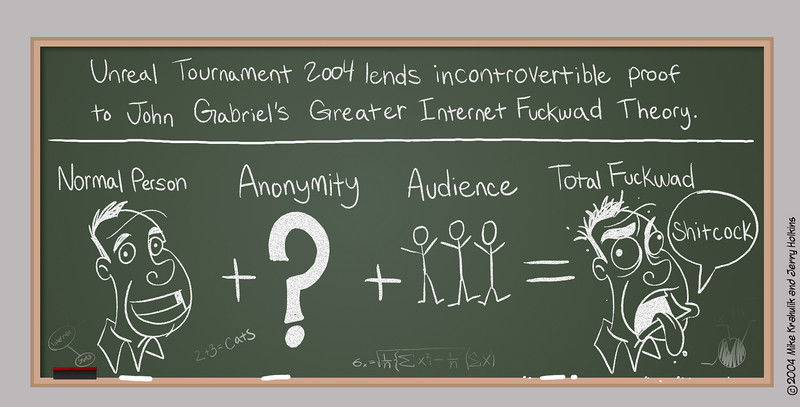I purposely missed out this update from the last post because I feel that I have a lot to express. The first lesson on a Monday is Computer Game Studies. In this session, we’ve been looking at and discussing a range of topics regarding video games.
In the middle of November, we looked at the behaviours of people involved in gaming culture, specifically the competitive or ‘pro’ gamers. This was examined through a cringe-worthy review of footage from early XBOX competitions.
It’s saddening to be reminded of how aggressive and ape-like people can be over games, regardless of any money involved. The vulgarity and disrespect that explodes from some of the players is something I imagine coming from a caricature of a football hooligan, not from those who enjoy pretending to be a super soldier in a fantasy world. All I see are bad losers and even worse winners, as I simply can’t relate to their attitudes towards each other.
Yes, video games are as competitive as any other activity like sports or gambling, but when I was younger my group of friends and I would revel in the chance to play multiplayer games together. Every now and then someone’s parents would be out for the day, so you’d take your controller and your memory unit to their house and squash into a room with some other kids who were filled with excitement. We wanted to see who was the best, sure, but it was still just a game, we didn’t need to worry about anything outside of our performance and enjoyment. Surely we weren’t alone in this, we couldn’t have been the only people actually appreciating the ability to play against some real people in our favourite games.
So what’s changed? There are fewer changes in gaming culture, which I can remember, that seemed to influence the behaviours of my fellow gamer as much as the arrival of online console gaming.

The rise of the internet gave us services such as XBOX Live, which allowed any console gamer with an internet connection to frag strangers online. The problem was that the lobbies for these online games soon became inundated with naïve young fellows, who thought that they should use this as an opportunity to abuse these strangers without fear of reprisals. While I imagine it to be true – that the P.C. platform had these problems before consoles – it was only with the popularity of games consoles, that this issue came screaming out of the television sets of many shocked and annoyed parents. I would say that most people play video games for entertainment, for fun; not to be called names, be screamed at or to engage in a slagging match with a cocky and offensive adolescent.
When we observe these negative behaviours online we usually have only a few options; engage the person, which only serves to make the problem worse; report the person, which never seems to be taken seriously; or, to ignore the person by muting their voice or just leaving the lobby, which I found the best option.
While I understand that these people – who engage in this type of verbal tennis – would say that they are trying to play mind games or to ‘psyche out’ the opponent, I disagree with their choice to do so. I see it as them only continuing to spread a meme, a one which serves to create/reinforce a stereotype or to alienate people who don’t play videogames and anger those who are already critical of video games. Yes, you’re a teenager or young adult and yes, you know a lot of swear words; but no, you don’t have to call your opponent out with witty remarks so you can feel better about yourself. Even if you claim that it’s harmless because it’s just for laughs or dramatised for T.V.
If you play games online or in competitions with your friends, then I believe there’s an opportunity for you to challenge the status quo. You can show people that you would rather be a good spirit, celebrate other people’s successes and learn from your losses humbly than berate them personally and debase yourself with trash talk.
I know that these bad attitudes will always be around and that I can’t say for sure if the world changed or my exposure to this made me bitter, but I guess what I’m trying to say is, “play nice kids”.
For our assignment in this lesson, I will need to research and write up about the history of the video games industry, starting with 1958’s ‘Tennis for Two‘.
I took plenty of notes on the subject and I look forward to starting this assignment because I remember doing a timeline/history essay on computers back in comprehensive school and getting praise for my writing. We have no hand in date for this yet but I’ll write up my notes over the holidays and see what else we need to do in January.
Steve also asked us to think up a shortlist, three points in our own gaming history which stood out and why. Here are my choices and why;
- Sega Megadrive – my first video game console which let me and my siblings play together with friends; with a great library of games.
- Final Fantasy VII – the first game which impacted me emotionally; had a convincing world which I wanted to explore for days; made me think about the power of the art.
- My first P.C. – enabled new experiences in an online environment; gave me the power to play and modify games; quickly became my hobby; expanded my knowledge because of its versatility.

